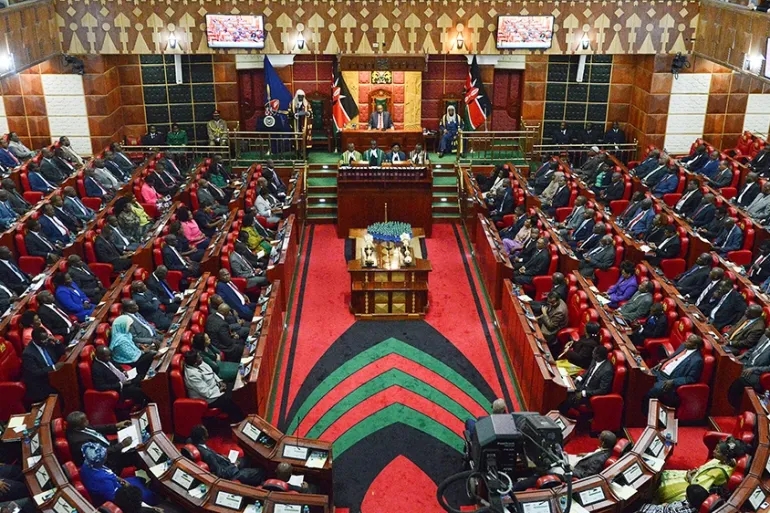Kisumu Water and Sanitation Company (Kiwasco) will save nearly Sh3 million annually following the commissioning of newly built offices.
The Sh204 million office in Tom Mboya estate has a gym and lactation room for breastfeeding employees and clients, and was completed within a record one year.
“We value our employees and want them to have a good working environment,” Kiwasco managing director Thomas Odongo said.
“We believe it is going to boost their morale, it is going to motivate them to go out of their way to achieve the objectives of the company.”
ODM leader Raila Odinga and Kisumu Governor Anyang Nyong’o presided over the launch of the new offices.
Raila said water is life and whoever addresses the problem of water addresses the fundamental lives and the development issue.
“I believe this effort will result in improving people’s health and prosperity through seamless coordination and delivery of critical programs of water, sewage, and sanitation services,” he said.
He praised the county for the effort to consolidate and the provision of water and sanitation services, which will give newborn babies a chance to survive.
Nyong’o said more people needed to be connected to clean water and water losses minimised by fixing leakages on time.
“Kiwasco must effectively deliver on their mandate. The provision of clean water and proper management of sewerage comes out very prominently in my manifesto 2023-27,” he said.
Kiwasco has for several years operated in rented offices at the city's downtown.
The construction of the new building on a Sh65 million land donated by the Kisumu government was financed by the National Bank.
Odongo said Phase 1 of the building cost Sh154 million. Kiwasco contributed Sh41 million, part of it being Sh 13 million for consultancy fee, while the rest was bank-financed.
The second phase cost Sh50 million, out of which 40 million was acquired from the National Bank, and the company contributed the Sh10 million difference.
Besides the new office, Kiwasco has also launched an elaborate Strategic Plan (2023-28) to continue providing adequate, clean potable water and to collect, treat and dispose of sewerage.
He reiterated that they will uphold their mission to provide quality water and sanitation services for improved livelihoods.
“Since 2003, the company in its maturity stage (2023) has celebrated major milestones,” Odongo said.
He cited the water production capacity of 80,000m3 per day, billing of Sh85 million, transition to ISO 900:2015 in 2018 and Recertification of 9001:2015 in 2022.
Other milestones include the construction of the new office building, the launch of a call centre and the acquisition of an eight-year operating licence.
Moreover, non-revenue water (NRW) has averaged 35 per cent, and a calibration laboratory (Meter Test bench) ISO/IEC 17025:2017 has been accredited.
The company, Odongo said, continues to impact the community around it through its three key pillars of corporate social responsibility, environment and climate action by educating and encouraging children on the need to plant trees.
“We are also offering business opportunities through master operators, water kiosks and manual pit emptiers to the vulnerable in low-income areas,” he said.
The company also provides education sensitisation and creates school awareness of the environment, water use, hygiene and sanitation.
Currently, Kiwasco boasts of a water network mapped at 731.2km due to several infrastructure strategically spread across the city.
The company has two water treatment plants, Dunga, which produces 44,000m3 a day, and Kajulu, which produces 36,000m3 a day.
It also has five reservoir tanks spread across the city for ease of distribution.
In addition, the water company has two sewer treatment plants: Nyalenda Oxidation Ponds with a daily treatment capacity of 18,000m3 and Kisat Sewerage Conventional treatment plant with a capacity of 8,000m3 a day.
This translates to 163.4km of sewer network mapped as of June 2023.
Odongo cited the effects of climate change in Lake Victoria, which requires continued concerted effort.
The company also grapples with water hyacinth, increased lake levels, pollution and the recent upwelling of the lake.
Over the past 20 years, the company has managed to reduce its NRW (water loss) from more 75 per cent at inception to an average of 37.4 per cent by the end of June 2023.
“The biggest cause of water loss in Kisumu remains the dilapidated networks laid in the 1960s that often lead to bursts and leaks,” Odongo said.
The other major contributor is the theft of water, especially among the rich.
Odongo said the company earlier in the year created a department to solely deal with NRW.
Nyong'o praised Kiwasco for the Strategic Plan that aligns with the county’s interest in water and sanitation service delivery as contained in its County Integrated Development Plan 2023-27.
Nyong’o said he has robust plans to transform Kisumu into one of the greatest intermediary cities in the world.
The governor called for an adequate water distribution network.
He said there will be reduced distances that people will walk to access the nearest water point.
Nyong’o reiterated the county’s commitment to providing good roads, water systems, sewage, drainage and electricity to the residents.
“These services must be adequately provided to those living in the informal settlements just like we provide in other areas, as they dearly need them,” he said.
Nyong’o praised the board of directors and management of Kiwasco for the speedy completion of the new office block.
He said good planning was the height of success and it has enhanced the image of Kisumu in line with the county's transformation agenda.
Nyong’o urged Kiwasco to embrace technologies to improve its services to the people.













